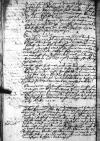Wir sein bericht, das unser wein aus Spain (Hispania)⌊Hispanien(n)Spain (Hispania)⌋ bey Johann Breden (Hans Preden) (†after 1545), factor of the Fuggers in Gdańsk (AT 13, p. 187; p. 153, footnote 49)⌊Hans BredenJohann Breden (Hans Preden) (†after 1545), factor of the Fuggers in Gdańsk (AT 13, p. 187; p. 153, footnote 49)⌋ sey. / Wir haltens aber do vor, das der beste zu Antwerp (Antwerpen, Antverpia), city in the Low Countries, from 1315 a Hanseatic port, in the 16th century the centre of Brabant’s artistic life and the wealthiest trade city in Europe, today in northern Belgium⌊AntorffAntwerp (Antwerpen, Antverpia), city in the Low Countries, from 1315 a Hanseatic port, in the 16th century the centre of Brabant’s artistic life and the wealthiest trade city in Europe, today in northern Belgium⌋ ausgetrunken / und ein ander her geschickt word(en) sey. / Wolt in vorsuchen / und so der smak gefelt, / so vil euch lieb ist do von nemen(n). / Sunst wisse[...] paper damaged⌈[...][...] paper damaged⌉ wir nicht sunders oder newes dis mol on the margin⌈dis moldis mol on the margin⌉ zu schreibn(n). / In acht oder X tagen werd wir ein reitenden boten an den h(e)rn Piotr Tomicki (*1464 – †1535), humanist, statesman, diplomat, one of the most trusted collaborators of King Sigismund I of Poland; 1500-1503 Chancellor of Cardinal Fryderyk Jagiellon, 1502 Gniezno Cantor, Archdeacon of Cracow, 1503-1505 servant of Jan Lubrański, Bishop of Poznań, 1504-1510 Canon of Poznań, 1506 royal scribe, 1507-1519 Grand(?) Secretary, 1509 Canon of Włocławek, 1510-1514 - of Gniezno, 1511 Custos in Kielce and Sandomierz, 1514 Bishop of Przemyśl; 1515 Crown Vice-Chancellor, 1520 Bishop of Poznań, 1523 - of Cracow; from 1524 (at least) General Collector of świętopietrze (Peter's pence), 1509 royal envoy to the Dukes of Pomerania and to Mecklenburg, 1510 - to Wallachia, 1510, 1511, 1512, 1513 - to Hungary (WYCZAŃSKI 1990, p. 268)⌊bischoff von Cracow (Kraków, Cracovia), city in southern Poland, Małopolska, on the Vistula river, from 1038 capital of the Kingdom of Poland⌊KrakouCracow (Kraków, Cracovia), city in southern Poland, Małopolska, on the Vistula river, from 1038 capital of the Kingdom of Poland⌋Piotr Tomicki (*1464 – †1535), humanist, statesman, diplomat, one of the most trusted collaborators of King Sigismund I of Poland; 1500-1503 Chancellor of Cardinal Fryderyk Jagiellon, 1502 Gniezno Cantor, Archdeacon of Cracow, 1503-1505 servant of Jan Lubrański, Bishop of Poznań, 1504-1510 Canon of Poznań, 1506 royal scribe, 1507-1519 Grand(?) Secretary, 1509 Canon of Włocławek, 1510-1514 - of Gniezno, 1511 Custos in Kielce and Sandomierz, 1514 Bishop of Przemyśl; 1515 Crown Vice-Chancellor, 1520 Bishop of Poznań, 1523 - of Cracow; from 1524 (at least) General Collector of świętopietrze (Peter's pence), 1509 royal envoy to the Dukes of Pomerania and to Mecklenburg, 1510 - to Wallachia, 1510, 1511, 1512, 1513 - to Hungary (WYCZAŃSKI 1990, p. 268)⌋ schicken(n). / Wolt ir was do ausgericht haben, / sey wir willig. / Hiemit Gote dem almechtigen befholen.
 AAWO, AB, D. 67, f. 288v (b.p.)
AAWO, AB, D. 67, f. 288v (b.p.)
